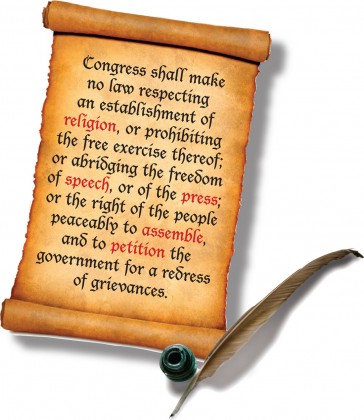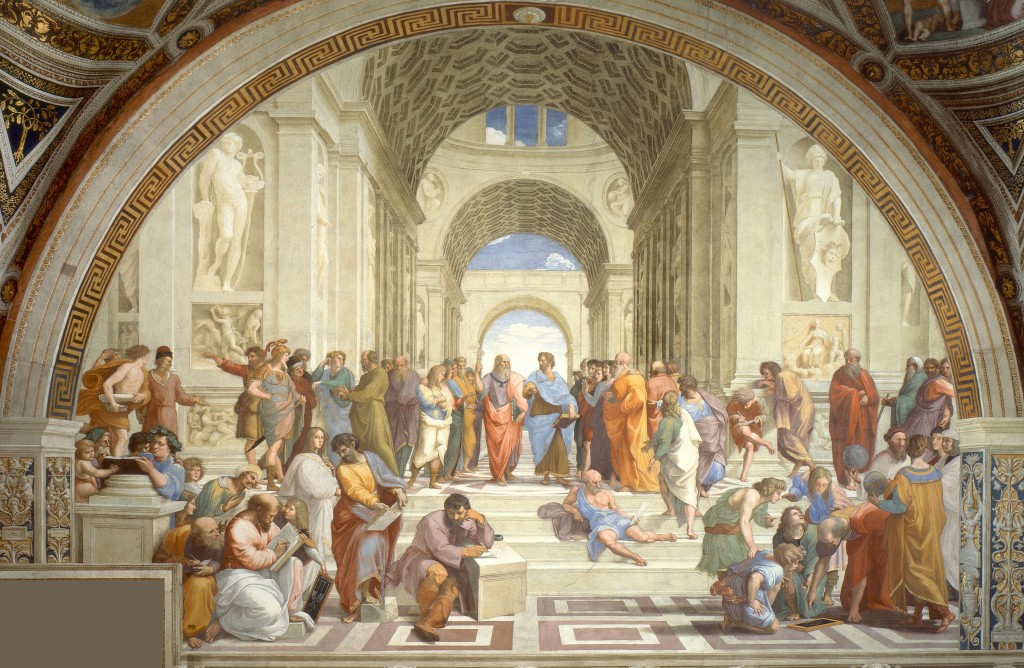Law students spend the better part of three years beetling their brows over the study of constitutional law—a mercurial, opaque, highly theoretical system of textual exegesis, which nobody but the tenured and long-winded professor pretends to understand. And the capsheaf of con-law contwistification is First Amendment law. The First Amendment protects “the freedom of speech” and has spawned an absorbing delusional system of case law, because the harder you work to understand it, the more complex and inscrutable it becomes, until its tracts and tiers and modes of analyses, its time, place, and manner restrictions, its public and private figures and forums, its symbolic expressions and invasions of privacy–all evanesce into vaporous metaphysics.
The average citizen knows only that the First Amendment does not mean what it says (i.e., “Congress shall make NO law . . .”), because Congress in fact makes laws abridging the freedom of speech (laws against child pornography, obscenity, fraud, so-called “fighting words,” and so on). To the layperson, the First Amendment must mean whatever nine robed Platonic Guardians say it means: “This political speech is good, we’ll protect it. This obscene speech is bad, we’ll call it ‘unprotected speech’ and let governments ban it.” Voila! And if that’s the case, why can’t The Nine read the First Amendment to ban the speech of the Westboro Baptist Church and protect the grieving families of fallen soldiers from lunatic religious delusions on the most painful day of their lives? Or why can’t the Court allow Congress to regulate campaign financing to protect us from wealthy Wall Street corporations and moneyed special interests?
When the Supreme Court addresses these questions, they steer between two competing principles of First Amendment jurisprudence that will never be reconciled (think Scylla and Charybdis, a rock and a hard place, the horns of a dilemma).
One principle is called the marketplace of ideas, first formulated by Justice Oliver Wendell Holmes, who wrote:
“The best test of truth is the power of the thought to get itself accepted in the competition of the market. —Abrams v. United States (1919)
To Justice Holmes, there’s no such thing as good or bad speech, only speech that competes in the Darwinian marketplace and lives or dies. The Court’s job is to strike down any attempts by the government to regulate the marketplace of ideas. Of course, there are the inevitable exceptions, because Holmes was also the Justice who wrote: “The most stringent protection of free speech would not protect a man falsely shouting fire in a theater and causing a panic.”
Justice Louis Brandeis offered a parallel and sometimes competing principle of First Amendment theory eight years later, when he articulated what might be called the purpose of the First Amendment:
“Those who won our independence . . . believed that freedom to think as you will and to speak as you think are means indispensable to the discovery and spread of political truth; that without free speech and assembly discussion would be futile . . . ” —Whitney v. California (1927)
See how Justice Brandeis suggests that the First Amendment does not exist to protect all speech; it exists to protect speech that leads to the discovery and spread of “political truth.” Brandeis wants to protect speech, not because it’s an absolute value or good for the soul, but because it’s essential for democracy and civic republicanism. Quite a different concern than Justice Holmes’ marketplace where it’s every idea for itself and survival of the fittest. In fact, Holmes would probably say that there is no such thing as “political truth.” Truth is whatever the marketplace says it is. If the Gangnam Style YouTube video beats out President Obama’s State of the Union address, so be it.
And the best description of these two ideas as applied to a single case is Stanley Fish’s Opinionator column What is the First Amendment For? published in the New York Times shortly after the Supreme Court’s opinion in Citizens United v. Federal Election Commission. Fish sees Justice Kennedy’s majority opinion and Justice Steven’s dissent in Citizens United as a replay of the age-old war between the marketplace of ideas and the protection of “political truth”:
Kennedy, along with Justices Roberts, Alito, Thomas and Scalia (the usual suspects), is worried that the restrictions on campaign expenditures imposed by the statute he strikes down will “chill” speech, that is, prevent some of it from entering the marketplace of ideas that must, he believes, be open to all voices if the First Amendment’s stricture against the abridging of speech is to be honored. (“[A] statute which chills speech can and must be invalidated.”) Stevens is worried — no, he is certain — that the form of speech Kennedy celebrates will corrupt the free flow of information so crucial to the health of a democratic society. “[T]he distinctive potential of corporations to corrupt the electoral process [has] long been recognized.”
So who wins? Well for now, it’s the marketplace of ideas. The Roberts Court is poised to strike down another Arizona campaign finance law. The idea behind the Arizona statute is to “level the playing field” by providing matching funds to candidates who accept public financing. But to chief justice Roberts, leveling the playing field is government meddling in the marketplace of ideas, as evidenced by his questions at oral argument.
“I checked the Citizens Clean Elections Commission Web site this morning,” the chief justice said, “and it says that this act was passed to, quote, ‘level the playing field’ when it comes to running for office. Why isn’t that clear evidence that it’s unconstitutional?”
For the moment, at least five justices on the Court list toward the marketplace of ideas when it comes to First Amendment analysis, but when new Platonic Guardians arrive on the bench, they may have a different opinion.



